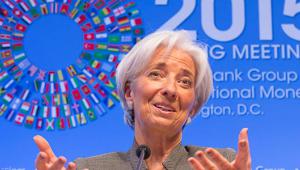By Vivienne Russell | 4 February 2013
Fiscal policies across the globe need to focus on social inclusion as much as economic growth, International Monetary Fund managing director Christine Lagarde has said.
Delivering the BBC’s annual Richard Dimbleby lecture in London last night, Lagarde set out her vision for a new multilateralism, stressing the importance of co-operation between nations and institutions to manage increasing economic inequalities and environmental threats.
She made a plea for a more co-operative financial system that serves people rather than rules them, and she criticised nations that compete for business investment by lowering taxes on corporate income.
‘This could make inequality worse,’ Lagarde said.
Income inequality was singled out, along with environmental degradation and demographic change, as one of the three major challenges facing the world.
Seventy per cent of the world’s people live in countries where income inequality has increased over the past three decades, she noted.
Yet economists had under-estimated the importance inequality in the past. ‘Today we are more keenly aware of the damage done by inequality. Put simply, a severely skewed income distribution harms the pace and sustainability of growth over the longer term. It leads to an economy of exclusion and a wasteland of discarded potential,’ said Lagarde.
Fiscal policies had a role to play in reducing inequality as they could make taxation more progressive and increase access to health and education services as well as supporting targeted social programmes.
‘Yet these policies are hard to design and – because they create winners and losers – they create resistance and require courage,’ she said.
‘Nevertheless, we need to get to grips with it, and make sure that “inclusion” is give as much weight as “growth” in the design of policies… More inclusion in the economic life also means less cronyism and corruption. This must also rise to the top of the policy agenda.’
Elsewhere, she urged the creation of financial system fit for the 21st century.
This would be a system that worked for the productive economy rather than its own interests, she said, where jurisdictions worked for international interests and a regulatory structure that had a global reach.
‘We also need the 21st century multilateralism to get to grips with big ticket items like climate change and inequality,’ said Lagarde.
‘On these issues, no country can stand alone. Combating climate change will require the concerted resolve of all stakeholders working together – governments, cities, corporations, civil society and even private citizens.’













